“Travelling the world” means very different things to different people. Some might choose to hitch-hike, couch-surf and pot-noodle their way slowly from place to place all on their own, while others might prefer to hop on a giant round-the-world cruise with 2,000 other people. Different ways of travelling all bring different advantages and disadvantages, and one of the biggest factors which might influence your travel experience is whether you choose to go-it-alone, or to join an organised tour with others.
We have been lucky enough to sample a myriad of different types of travel, and travel companions. We’ve travelled independently, as a couple, with friends, with family, and with total strangers who later became friends. We’ve tried road trips, camping trips, overland trucks, cruises, small group tours and virtually everything in between, and in this blog post we each give our we thoughts on the pros and cons of different types of travel.
1. Classic backpacking
Definition:
The phrase “travelling the world” often conjures images of young people traipsing around South East Asia with large backpacks. Of course, you can backpack anywhere around the world and at any age, and for us “backpacking” generally involves travelling independently from place to place, catching local transport, and staying in hostels, guest houses or homestays.

Backpacking around Europe – Seville’s Plaza d’Espana
Georgia:
If you want to stay flexible, independent backpacking is the way to go. You can choose to plan a detailed itinerary, or not plan at all. You can stay in trendy boutique hostels or airbnb apartments, or you can couch-surf at the home of a local resident and eat cup noodles and street food. Or you can do both, changing it up depending on your budget and mood at any given time.
The downside of so much flexibility is that you have endless choices, and you have to make them all yourself. When we travel independently, we tend to spend a significant amount of time planning every aspect of our trip – we try to track down cheap flights, accommodation bargains and the most efficient transport routes. There is no end to the amount of blogs, Tripadvisor reviews and guidebooks you can read, which can be very helpful, but also a little daunting. The paradox of choice is real.
It’s often assumed that independent backpacking is the cheapest way to travel, but that depends on the choices you make and the time you put in to finding the best deals. Happy to sleep on a stranger’s floor and hitch hike to wherever you end up next? Then independent travel is certainly the cheapest way to do it. Want to rock up at the best looking hostel at the last minute and take speedy flights when you feel like it? Then you might not save much cash, but you’ll be able to be spontaneous at all times.
If you’re worried about being on your own and want to meet like minded travellers, you’ll almost certainly be able to do so as long you’re staying in ‘backpacker’ hostels and not veering too far off the tourist trail. The downside? We’ve found that most of our interactions with other backpackers tend to be quite shallow and superficial, as by their very nature other backpackers are always coming and going. Once you’ve talked about the basics a thousand times (“Where are you from? Where are you going? Do you know if there’s a good supermarket near here?”), you might be longing for a few familiar faces where you can talk about something other than the weather or who ate the most authentic street food last night.
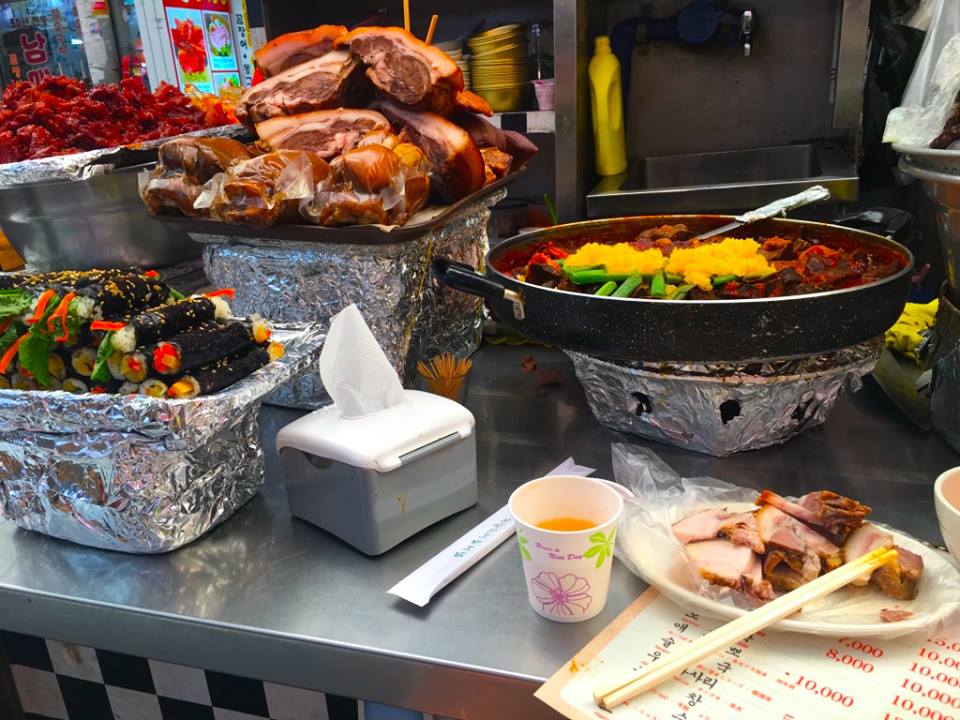
Street food in Seoul
Shane:
Backpacking…hmmm. Makes you think of people in flip flops and braided hair carrying bags that look bigger than them. Often it just looks like a bag with legs. Wow, that turtle is standing up!
The advantages of backpacking are:
- Flexibility – if you find somewhere nice then you can stay there for longer. If you want to get out quick, you can! also the same goes for the opposite.
- Infinite options – you are able to create your own itinerary. You are not restricted to a route, a well trodden tourist path or an organised trip.
- Possibility for different experiences and interactions – you have the opportunity to experience the culture and people who live where you are travelling. There is no guide to act as a buffer between you and the locals, so you can be fully exposed to their way of life, different languages, and different foods. If you are travelling alone you are more likely to be invited into people’s homes, share a meal or even attend a wedding!
The disadvantages are:
- Planning – You can backpack without much planning, however this can result in you never leaving a country, area or even a beach as it seems like too much effort and you like where you are (this is not really backpacking though is it?) If you do decide to make plans last minute (for example, arrive in a new city and have to find somewhere to stay) this may be costly but can also result in you having to try lots of different hostels before you can get a room. By planning ahead you can select the correct location, facilities and also best value before you arrive in a boiling hot country carrying all your belongings on your back. Planning before you leave means you don’t have to take time out of enjoying the places where you are to search the internet or walk the streets.
- Loneliness – If you are forever on the road and moving from place to place it can be easy to meet people, but these people will only be around for a few days before someone moves on. You can try get to know them during this short window, but most of the conversation will start with “Where are you from, Where are you going, Do you know a good restaurant/laundry/bar/Atm around here?”
- Cost – Often backpacking is seen as the cheapest way to travel, but that might not be case. We have in the past picked group/organised travel over going it alone as you can get discounts and negotiate better prices in a group.
- Time – If you have a strict time-frame in which you have to travel and are not one for detailed planning, (luckily for me, Georgia is) then backpacking may not be for you. If you do not want to be confined by places and times then there is a risk you will end up spending too long in one place and not seeing everything you originally wanted to see.
2. Road-tripping
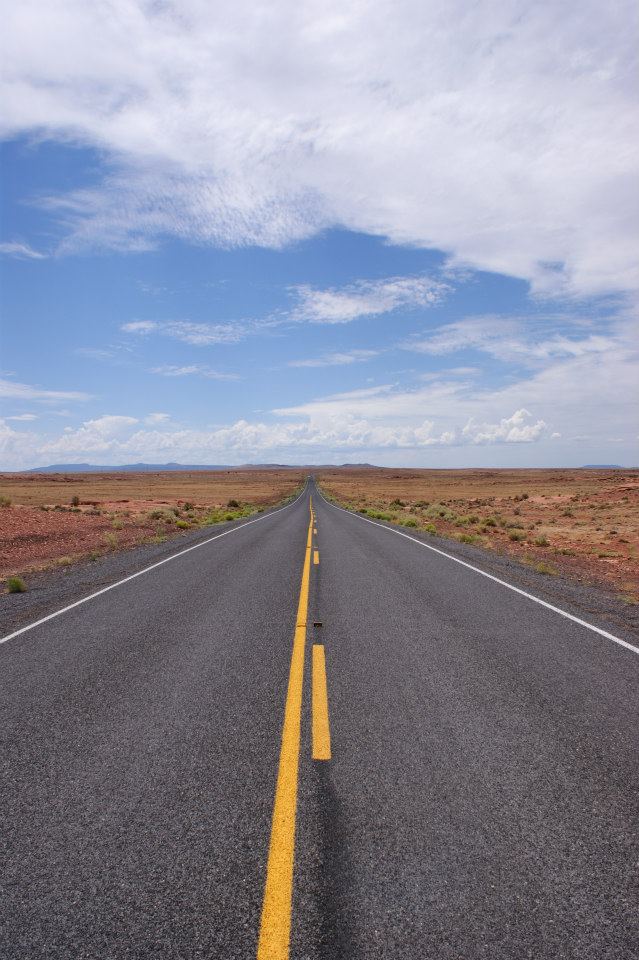
Route 66, USA
Definition: We love a road trip. With your own set of wheels, the world really is your oyster. You can explore areas no one else has even thought to visit, take a car-load of stuff along for the ride and you never have to worry about getting up on time to catch a bus. As well as small scale road trips in Italy, Slovenia and around Ireland and the United Kingdom, Shane and I have also embarked on an epic road trip across the United States, and of course, the ultimate motoring adventure: the Mongol Rally.
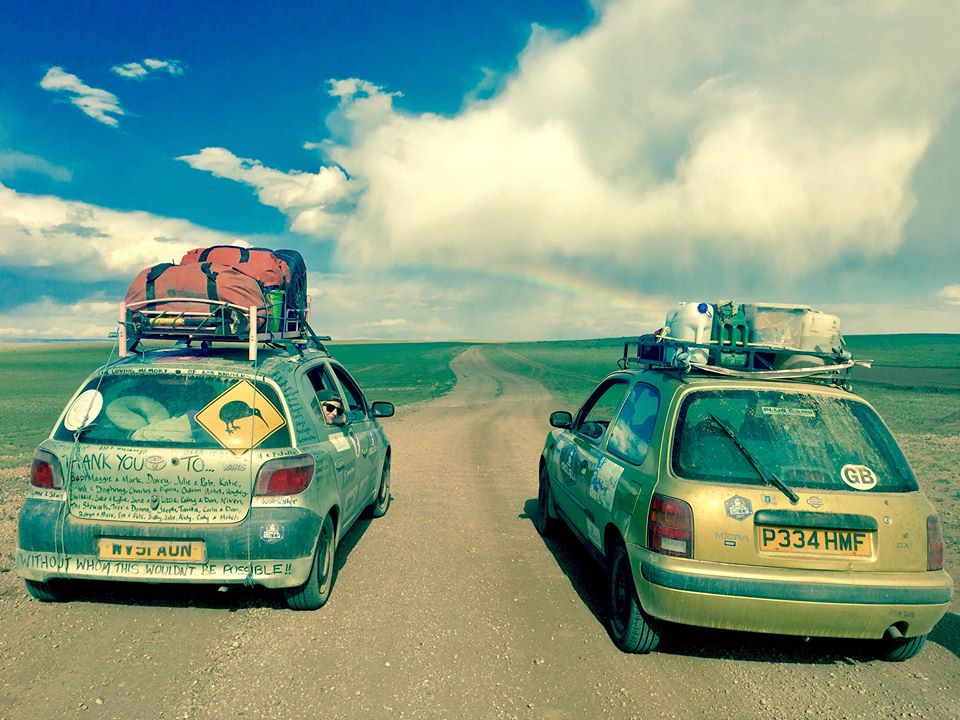
Knobby and Martha on the ultimate road trip, Mongolia
Georgia: When travelling across borders outside of Europe, road trips can end up being pretty difficult and pretty pricey, but within Europe or large countries, they are (in my opinion) the best way to see the world.
The main advantages include:
- Maximum flexibility with limited research required – all you really need is a map, the ioverlander app (which finds good places to camp or hostels to stay in), a tent and a vehicle. Outside of major tourist hot spots we’ve rarely needed to book a campsite, and wild camping spots can usually be found.
- Potential to save cash – if you are in a couple or in a group, travelling with your own vehicle tends to be cheaper than taking buses, trains and planes (even factoring in the cost of a vehicle / vehicle hire, fuel and insurance), and if you choose to camp (either often or occasionally), you can save even more. The more people you travel with, the cheaper your road trip will be!
- Ability to stop at destinations not easily reached by public transport, and have a whole host of fun (random) experiences – rather than taking buses from backpacker hostel at tourist hotspot to backpacker hostel at tourist hotspot, a road trip really does allow you to journey down ‘the road less travelled’. If you see an interesting sight (e.g. a strange horse shrine) by the side of the road, you can pull off and go for a look. If you want to venture down a non-existent path to check out some hot springs, you can!
The disadvantages of road-trip travel are mainly vehicle related:
- While you won’t have to worry about arriving at the bus station on time, you will have to worry about filling up with fuel, parking, obeying local driving regulations and coping with different (and potentially crazy) driver behaviour.
- It can be even more difficult to meet people if you’re travelling to off-the-beaten-track destinations and not staying in backpacker hostels, which is another good reason to consider travelling as a group of three or four.
- The biggest disadvantage comes into play when you’re trying to cross borders or continents. Difficult regulations, extensive paperwork and exhaustive bureaucracy can be enough to make you want to abandon your trusty steed.
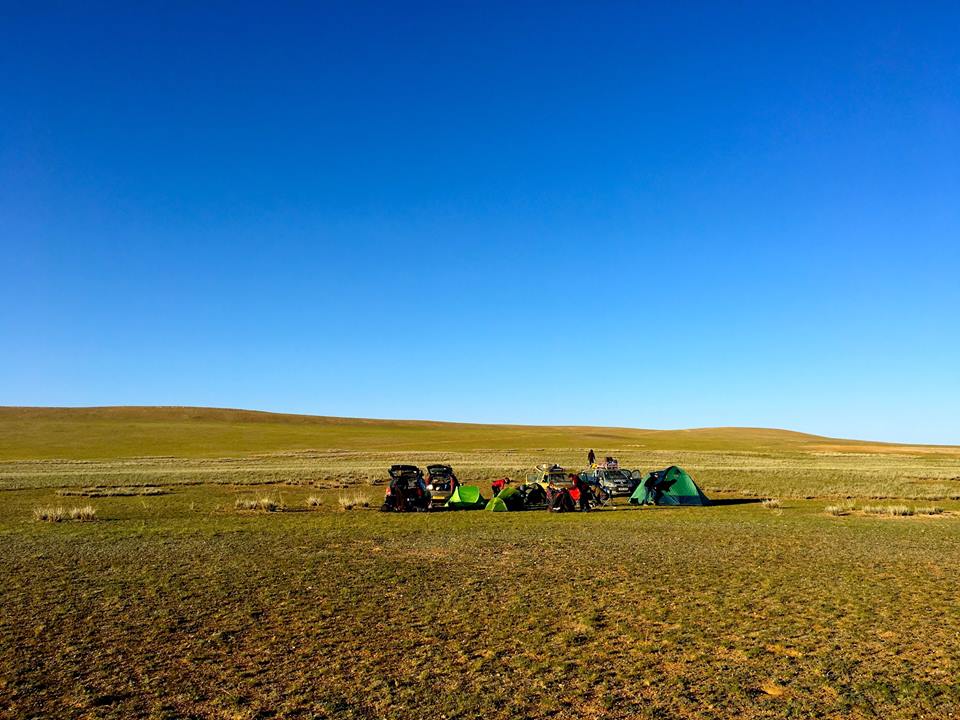
Wild camping in Mongolia
Shane:
Road trip yeah! Driving long distances cooped up in a car with people arguing over directions, what music we should listen to and where we should eat? Who wouldn’t love it.
Road tripping is similar to backpacking with the difference that you have your own transport. If you have limited time and an ambitious wish-list of destinations, then you still need to plan to make sure you see what you want to see. When we drove across the USA, Georgia worked out a detailed itinerary and booked accommodation in advance, so all we had to do was drive and enjoy. The perils of not taking this approach were clear on our most recent road trip – the Mongol Rally – where many teams had to skip over things they had really wanted to see (including skipping Mongolia completely) because they spent too long on earlier parts of the trip. This may have added to their sense of adventure, but had they planned at home before they left with the help of the internet, they would have seen the things they really wanted to see.
In addition to those above, the advantages of a good road trip include:
- Car Mates – On a road trip you will be with the same people for long periods of time (if you choose to go with other people that is). This means that while you may not get lonely you might get irritated after a few days or even hours, but ven your annoying car mates might be preferable to sitting in front of a screaming baby on a long distance bus or trying to placate a drunk Russian gold miner next to you on a train.
- Packing – With a road trip you may be able to bring more stuff without being restricted by having to carry your bag everywhere. You can fly to a destination and basically use the full baggage allowance and live out of the car.
- No waiting – For buses or trains! When you leave is entirely up to you or your car mates.
- Security – Having a car gives you some sense of security. You can be in your own bubble, unlike on a train or a bus, and you are completely familiar with it.
- Enviroment – This has affects Georgia more than it affects me, but if she’s not happy then I hear about it and that stops me being happy too. If you are on a public bus, it might be boiling or it might be freezing (we have been on buses in the Philippines where despite the outside temperature being over 30 degrees celcius, the air conditioning is turned up so high they hand blankets out). If you are in your own car you can control the temperature, and music is completely optional – you don’t have to put up with the driver’s favourite country and western CD on repeat!
The main disadvantages:
- Car mates – You can just imagine…snoring, music choice, smell, I could go on…
- Cost – Driving by car can be costly. Costs to consider include purchase price, rental, fuel, insurance and also smaller costs like tolls and parking. Divided by more than one person makes these costs easier to bear, and can make a road trip cheaper than the cost of public transport. A car or other vehicle an also allow you to travel to places where there is no public transport, so in some cases, a road trip might be your only option.
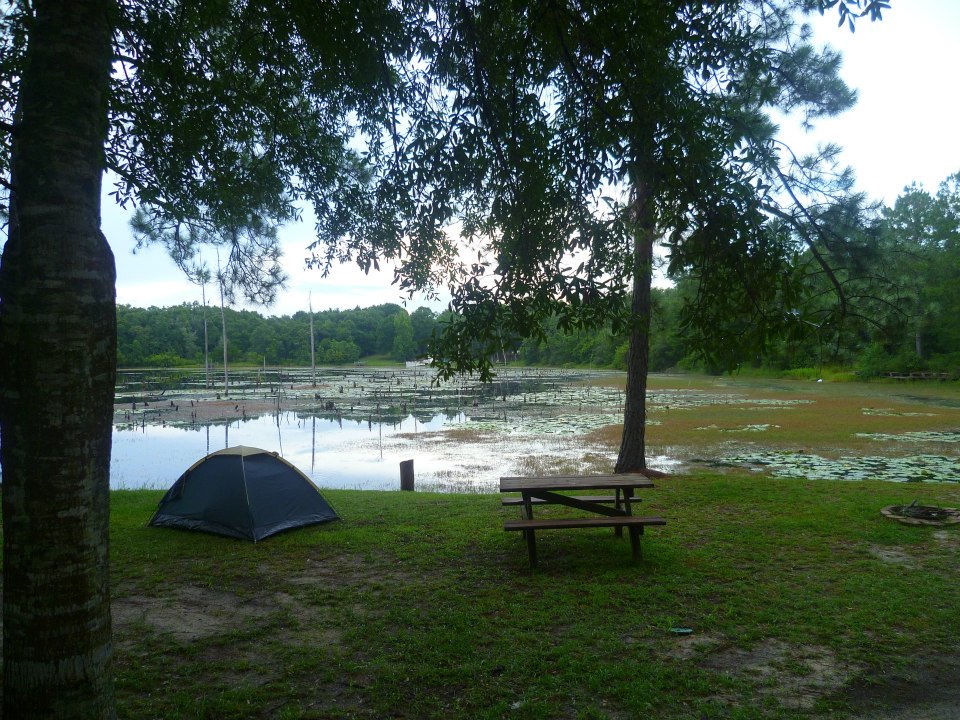
Little campsite off-road in Alabama, USA
3. Overlanding
Definition:
While a road trip or backpacking is often a form of overlanding (basically, travelling over land rather than flying or sailing), we are referring here to more commercial overlanding: taking an overland tour in a large, specially equipped truck. These trips sometimes last for months and rely on the participation of paying passengers for food purchasing and preparation, as well as setting up camp. Shane and I actually met on an eight month overland trip of this nature, which went from London to Australia, and more recently we’ve taken a shorter overland trip from Nairobi to Victoria Falls.
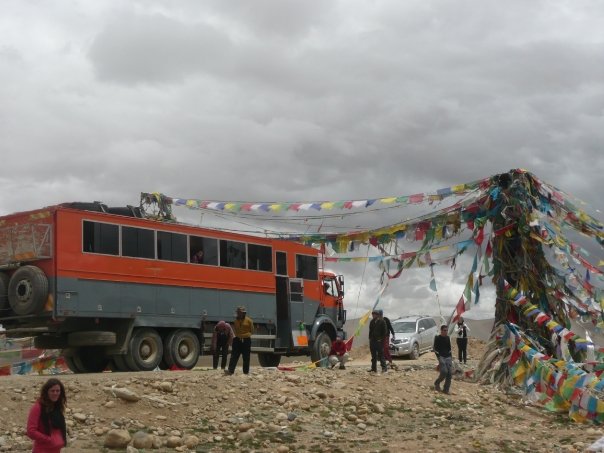
Overlanding in Tibet
Georgia:
Overland trips can be intense. The truck is your home, so you spend most nights camping out in the open. Sometimes these nights in the wild can be beautiful, breathtaking and memorable – camping on the Tibetan plateau is an experience I’ll never forget – but sometimes it can be downright miserable. Cold, wet, and dirty, or hot, sweaty and… oh yes, dirty!
This is a very unique way to travel, and it won’t suit everyone, but it is great if you don’t mind basic (and sometimes worse than basic) conditions, are happy to pull your weight by cooking, cleaning and keeping the truck secure, want to be surrounded by adventurous can-do people and form lasting relationships (Shane and I are third couple to get married from our first overland trip!), go places completely off the usual tourist route, and want to do it all for next to no money.
If you want to stay somewhere with a comfy bed (or just any bed) and a clean toilet (or just any toilet), want to feel like you’re on holiday, want complete freedom to determine your own schedule, and want a serious amount of alone time, this won’t be the trip for you.
Overland trips can be a good middle ground between completely independent travel and more structured ‘small-group’ travel. While ‘travel time’ will be spent on the overland truck with the people on your trip, and journeys will be broken up by camping together and eating together, once you reach a city or stop for a longer period of time, you can choose to get away from the group and even have a holiday away from the truck if you need a break from the overlanding experience.
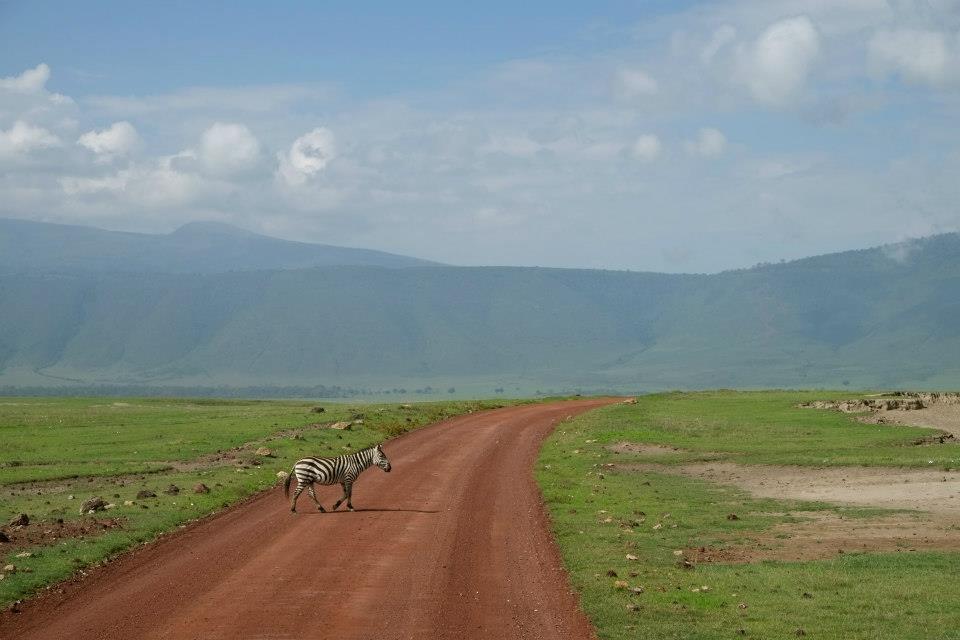
Overlanding through Tanzania
Shane:
Who fancies being stuck in an uncomfortable vehicle with strangers for weeks on end? I do! It really isn’t as bad as it seems – overlanding is a great way to travel and to spend time with and meet like minded people.
Advantages:
- Meeting people – There seems to be more of a social aspect to overlanding than to other forms of group travel; it’s similar to a road trip, with just a few more people. You will normally be cooking, camping and spending long days with people from varied backgrounds with a common interest in travelling.
- Cost – Overlanding can be very cheap as many of the costs are divided among the group, and accommodation is mainly camping which is basically finding somewhere to park and camp, which is free! Cooking is a group activity, food is purchased locally and it’s cheap.
- 50% planning required – Once you’ve picked which overland tour to take, the tough planning questions will be answered for you. This means you can concentrate on researching the destinations and buying the equipment you need, rather than spending hours finding accommodation or planning your route.
- Destinations – Like cruising, overlanding allows you to travel to many destinations on one trip, and often these destinations are remote. Luckily overland vehicles are often designed to tackle tricky roads or in some cases, no roads. As a result, the places you get to see will often be amazing and worth it.
- No Airport security – Enough said, although border crossings on land can also be tiresome and time consuming.
- You feel safe – Travelling with a vehicle gives you some security, just like road tripping. You don’t need to watch out the window to check no one is stealing your bag when it stops, you don’t need to be afraid to fall asleep. Travelling in a group also brings some security – wild camping feels a lot safer when there are 20 tents rather than one.
Disadvantages:
- Meeting people – You will be with these people for long periods of time, often months. When road tripping you have the option of picking your travel mates, but with overlanding you usually just take a gamble and turn up. For Georgia and I this worked out it seems.
- 50% planning still required – Although many of the large parts of the plan have been planned for you, you will still need to organise visas, buy your kit, plan what you want to see in each destination (and how you are going to see it), where you will get money and what you will eat.
- Short time in destinations – When backpacking or on a road trip you have the flexibility or at least the control over how long you stay somewhere. When overlanding, you don’t. Border crossing, illness and breakdowns can all affect your itinerary, but usually you will have a set number of days in each place. You may feel this is too long in some places or too short in others.
- No guide – Although this is an organised trip (50% organised) there is no real guide on board. There is a representative from the company who may be getting paid peanuts or not at all who will try and help where possible, but overland trips cover large areas it would be impossible for them to be an expert or guide in all these places. They act as more of a leader to help the group make decisions or to share information with.
4. Small group travelling
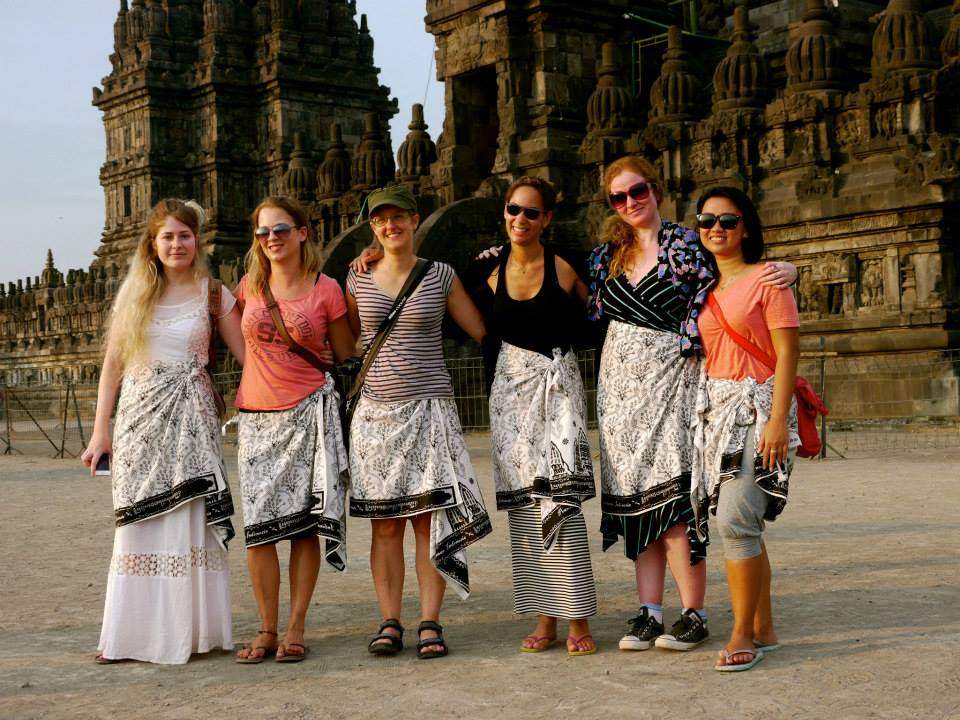
On a small-group tour with Intrepid in Java, Indonesia
Definition:
Small group travel typically involves taking an organised tour with an adventure travel company, who provide an itinerary and organise transport, accommodation and maybe some meals and activities, depending on the type of tour you book. You’ll usually have a local guide, travel using a combination of public or private transport and you might stay in a few off-grid places, like local homestays. We have taken several multi-day and multi-week tours over the last few years with Intrepid, gadventures, Tucan travel and Hoi An Express.
Georgia:
Small group travel tends to be easy and stress free when compared to organising everything yourself, and feels more like a holiday than overlanding. The drawback is you have less autonomy and flexibility – you might love the beaches in Thailand, but if you’re on an organised tour you can’t just extend your stay without consequence. When we’ve travelled with the likes of Intrepid and gadventures, the local guides go over and above to help you – we don’t usually need help finding an ATM or a laundrette – but if you do, you can just ask.
It’s also an easy way to meet people, without the stresses and strains caused by long-term overland travel which can cause frustration and group friction. The groups Shane and I have travelled with have all been made up of between eight and 16 people, which is an easy number to get to know, and we have made some life-long friends on these trips too.
Small group travel can be more expensive than travelling independently, but the trips are often good value for money, and it isn’t usually as expensive as you think. In parts of the world with poor tourism infrastructure, it can be difficult and expensive to travel independently – you might have to spend three days taking buses or taxis to different places, and then another two or three days organising local guides to see certain sights. As well as time, individual transport and multi-day accommodation stays cost more money than simply hopping on your private minibus and going to the next place.
If you want to travel somewhere that’s difficult to navigate on your own (for example, our gadventures tour was definitely the best way for us to see Sumatra), want to have a ready-made like-minded set of friends, and want to take it easy, small group travel is the way to go. If you want more freedom, flexibility, and to save every last penny, then it probably isn’t.
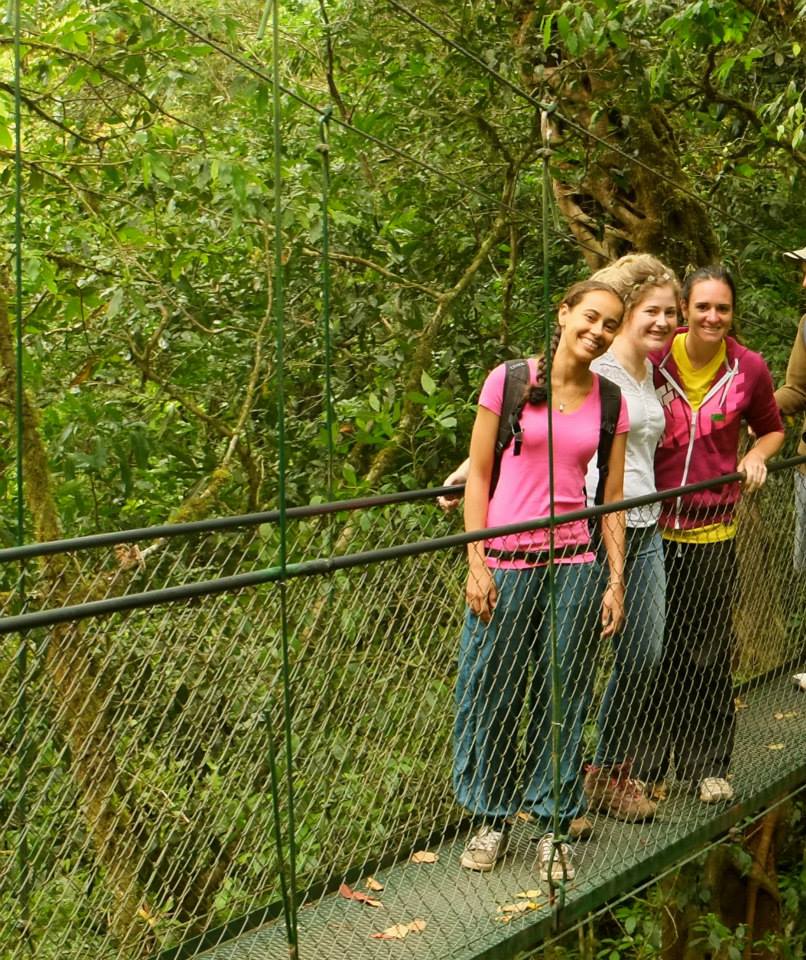
Travelling with new friends on a small group tour with Intrepid in Costa Rica
Shane:
Small group travel can be a backpacker’s nightmare, as it means being restricted to a detailed itinerary with people you have never met. For others it can be a holiday or adventure where you don’t have to plan or even think from day to day. Small group travel allows you the freedom to just enjoy the countries and places you are visiting.
Advantages:
- 99% Organised: On a small group tour, you just have to follow the group and see the sights. The trip will have been pre-planned by the organisation and also any changes required due to transport issues or weather will all be taken care of. Often this is done without you having to worry or even know. You can relax in a little bubble and enjoy the trip.
- Guided: These trips are normally 100% guided with a local guide or a person with prior knowledge of the area. They are like a parent, and they will tell you when to get up, where to eat, what to eat and how much money you need to bring. They take all the worry and planning out of a trip, and make it more like a holiday.
- Meeting people: Doing things as a group creates a strong bond and allows you to make friends quickly. It does also mean that if you don’t gel well with the group or guide this may affect how much you enjoy the trip.
- Maximises your time: The itineraries for these trips are often shorter, allowing you to pack in a lot in a short space of time and then return to studying or work. As you don’t have to spend time planning where to go next or how to get from a to b, they are a great way to travel if you only have two weeks of leave from work and want to make the most of it.
- Tried and Tested: The trips and iteneraries are tried and tested over and over again, so you can get accurate information in advance about where you will be, what you’ll be doing, and what it will be like. There are often options to take trips with the same itinerary but different accommodation options depending on your budget and the level of comfort you are looking for.
Disdavantages:
- Limited scope for adventure – As the planning is 99% done, there are not many unknowns before you go. Thousands of people will have done the same tour before you – the places where you eat and the places where you stay may be chosen for you, so you won’t get much opportunity to put your own stamp on the holiday. If you like going with the flow this is a great option, but if you’re looking for the ultimate adventure where no one else has been before, it won’t be suitable.
- Cost – All the worrying, planning and organising has been done for you, and this comes at a cost, especially when you factor in tipping tour guides and drivers. However, you can sometimes get better deals as a group than you can when you’re on your own, and when you factor in the time and cost involved in planning a trip like this yourself, they often start to look like quite good value.
5. Cruising

Floating milk carton, Japan
Definition:
Taking a luxury floating hotel to different ports of call around the world. A typical cruise ship will have a number of on-board amenities, such as one or more pool(s), a spa, several restaurants and eating establishments, a cinema, theatre and luxurious rooms and bathrooms. A cruise ship might stop at one or two ports of call, or might have a much bigger itinerary. One of the best cruises we have ever taken was a 12 day Disney Cruise to Scandinavia, which stopped in Copenhagen, Stockholm, Helsinki, St Petersburg and Tallinn, and we recently took a Celebrity Cruise from Tokyo to Shanghai.
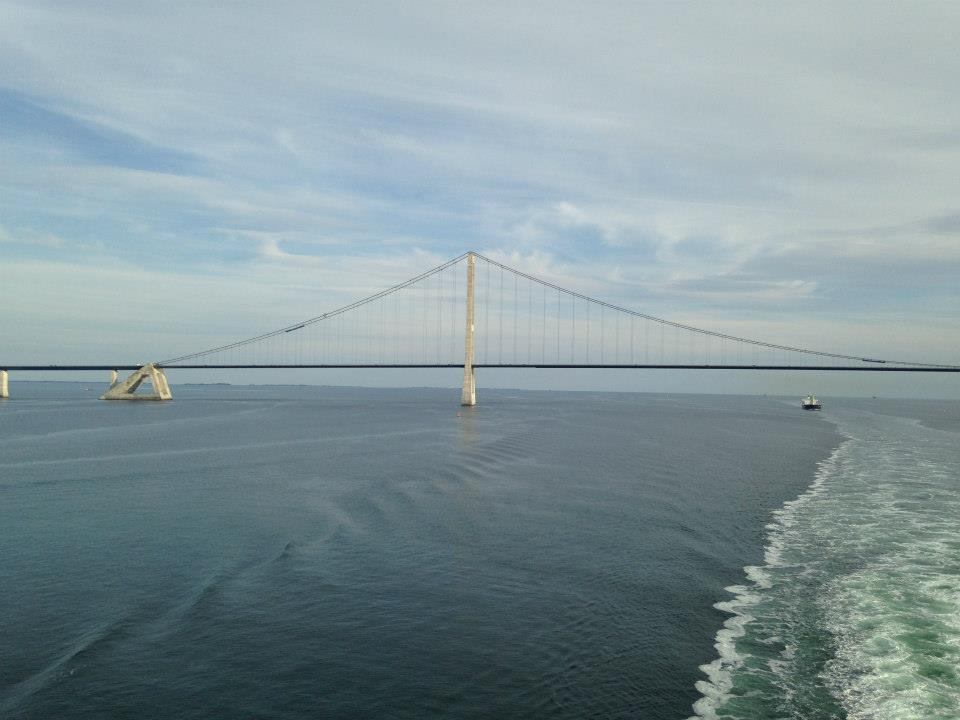
Sailing under the Oresund bridge between Sweden and Denmark
Georgia:
If you are looking for an easy and luxurious holiday, nothing can be better than a cruise. By day, the ship will stop at a new and interesting city or beautiful tropical island where you can see the top sights, and by night you will be back on board, ready to eat as much as you like and sample some great (and, let’s be honest, some not so great) entertainment. Forget cramped overnight buses, on a cruise you can go to sleep in one city and wake up (in comfort) in another. With hundreds if not thousands of other passengers on board, it isn’t hard to strike up a conversation and make some new friends. Equally, if you’d rather not, it’s not hard to stay anonymous amongst such a large group.
If the advantages of a cruise are ease, comfort and the possibility of making new friends, the disadvantages have to be the cost, the rigid itinerary and the horror of having new friends thrust upon you.
While cruises can be very good value for money (we would usually budget about £100 per day for a cruise, which includes all your travel, accommodation, food and entertainment), they are undoubtedly more expensive than any of the other options above, so unless you’re made of money, they’re not a sustainable way to travel. Unlike solo backpacking or even small-group travel, there is pretty much no flexibility whatever – while you can spend your day doing whatever you want (lounging by the pool, or independently exploring a new location), you can’t be back onboard the ship late, or it WILL leave without you. When it comes to making friends with you fellow passengers, we haven’t had much luck on the cruises we’ve taken. The clientele tend to be older, and weirdly competitive (“this is my 28th cruise! How many have you been on?). I’m sure there are some nice cruise passengers out there somewhere though!
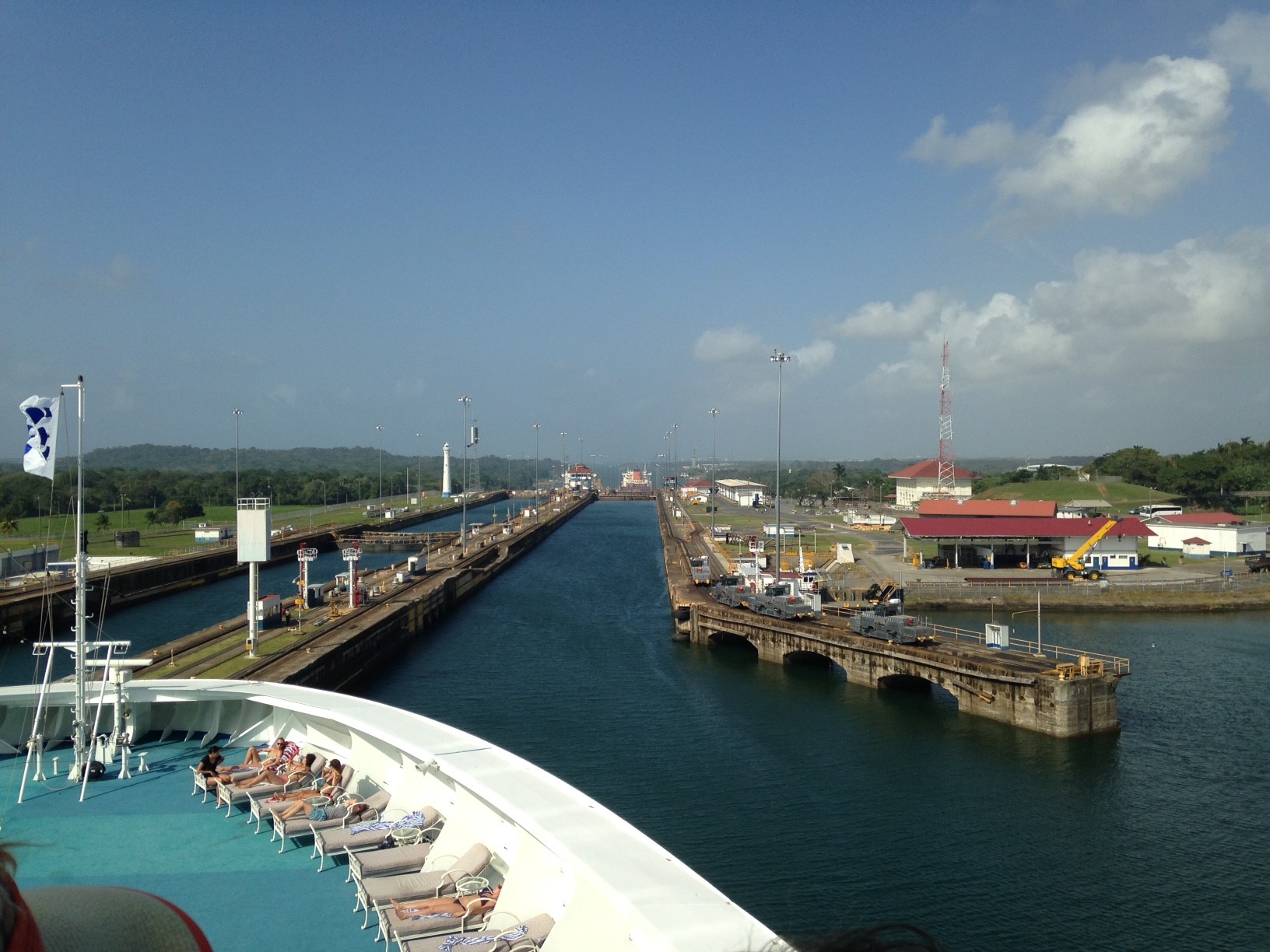
Cruising through the Panama Canal
Shane:
When you picture a cruise holiday, you immediately probably picture old people in Hawaiian shirts and crew in pristine, white uniforms touring the seas on large floating milk cartons.
These images are true somewhat accurate, but as a holiday cruises have a lot to offer. I am not a beach, pool or sunbathing person, and prefer to be seeing sights, learning new facts and staying active when I’m on holiday. Even so, I love a cruise, and it’s not just because of the food.
Advantages:
- It’s a floating hotel! You don’t have to keep packing and unpacking – you can fully settle into the environment of the ship, get to know the best pool, the best restaurants and the best place to watch the sunset, while travelling effortlessly from one amazing place to another.
- The food – you can have whatever you want, whenever you want. Breakfast is the best – continental, American, Full English or all three!
- Luxury – when you come back from a long day on shore, a crew member will be waiting for you with a cold towel (or, if it’s cold, a hot towel) and a refreshing drink. The accommodation, food and entertainment is all top quality.
- No airport security! Sometimes cruise passengers don’t even need to deal with visas, immigration or customs because they are only on shore for a short time and are granted special status.
Disadvantages:
- Short stops only – generally you will only be a port of call for one (or if you’re lucky two) day(s). Sometimes those days are actually quite short (e.g. 8am until 4pm), which doesn’t give you much time to see the sights. Cruises are a great way to test out places that you think you might want to visit on a longer holiday.
- The other passengers – apart from on our favourite cruise line (Disney), the stereotypical view of cruise passengers being older is unfortunately often true. While there are plenty of people to socialise with on board a cruise ship, you might not find you have much and common if you aren’t a) old, b) rich or c) obsessed with cruising.
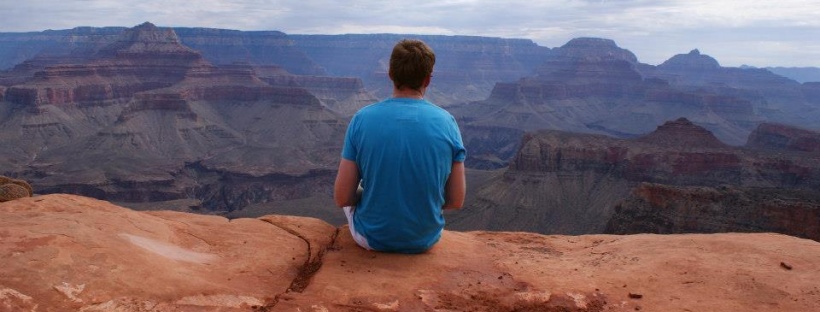
One thought on “What sort of travel is right for me?”